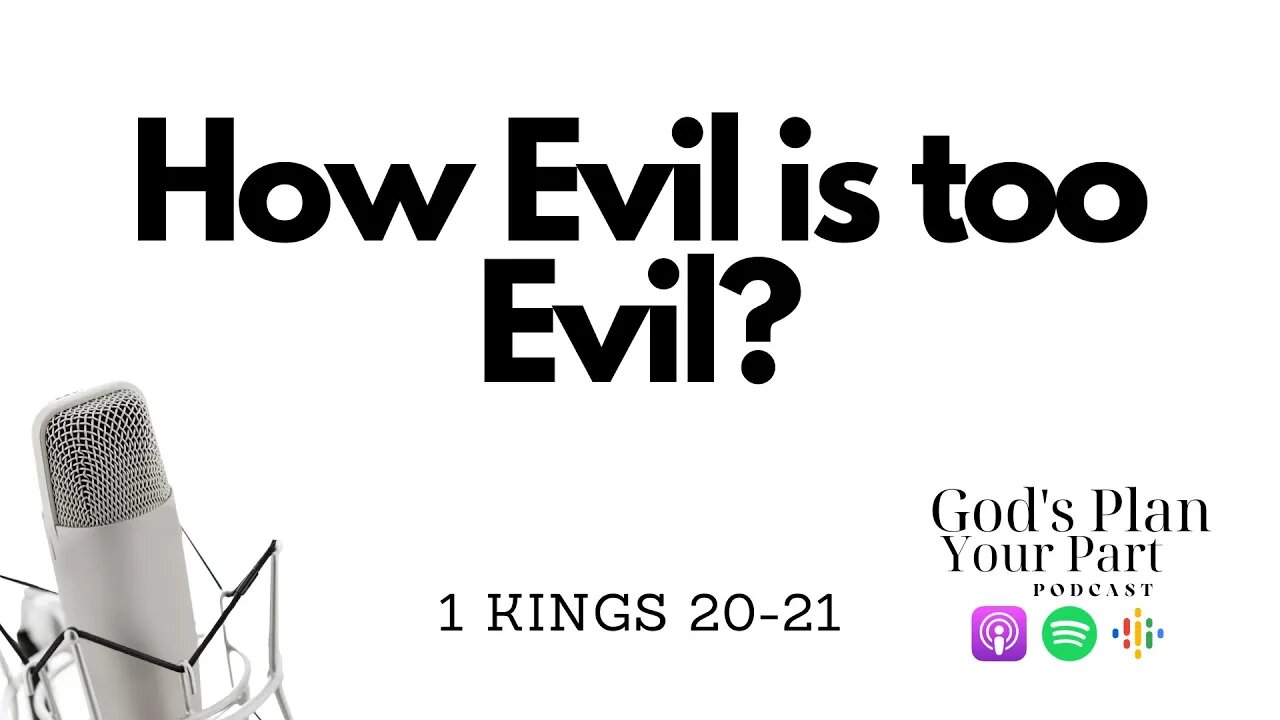Premium Only Content

1 Kings 20-21 | Is Ahab Evil?
Chapter 20 of 1 Kings portrays a battle between King Ahab of Israel and King Ben-Hadad of Aram. Through the prophet Elijah, God assures Ahab of victory and delivers a message that He will prove His sovereignty and protect His people. Despite being outnumbered, Israel defeats Aram in two successive battles. This victory serves as a divine judgment against idolatry and an affirmation of God's power and prophecy.
In Chapter 21, the focus shifts to a personal conflict involving Ahab and his wife Jezebel. Ahab desires to acquire Naboth's vineyard, but Naboth refuses to sell it, as it is his ancestral inheritance. Jezebel orchestrates a plot and falsely accuses Naboth of blasphemy, leading to his unjust execution. God sends Elijah to confront Ahab, delivering a powerful message of condemnation and divine retribution. Ahab humbles himself, resulting in a partial reprieve of God's judgment, but the consequences of his sin remain.
These chapters highlight themes of corruption, injustice, coveting, and the consequences of wickedness. They also emphasize the role of prophets like Elijah in challenging and rebuking those in power. Additionally, they illustrate the importance of humility, repentance, and seeking God's forgiveness. The story serves as a warning against idolatry, rebellion, and the abuse of power, while conveying the enduring lesson that God's justice and righteousness prevail over human wickedness.
In the narrative of 1 Kings 20-21, Ahab's character undergoes a significant transformation through his encounter with the prophet Elijah and God's judgment upon him. Despite his previous acts of wickedness and his role in promoting idolatry in Israel, Ahab demonstrates a moment of genuine repentance when confronted by Elijah. He humbles himself before God, tearing his clothes and wearing sackcloth, displaying a sincere desire to seek forgiveness and turn away from his sinful ways.
This display of humility and repentance shows that Ahab is not beyond the reach of God's grace. It serves as a reminder that God's mercy and forgiveness are available to all who sincerely seek them, regardless of their past actions or the depths of their wickedness. Ahab's repentance highlights the transformative power of genuine remorse and the willingness to acknowledge one's sins.
While Ahab's repentance does result in a temporary delay of God's judgment, the consequences of his previous actions still stand. This serves as a reminder that even though we may experience God's grace and forgiveness, there are often earthly consequences that we must face as a result of our choices. Ahab's story presents a complex picture of a flawed individual who, despite his evil deeds, has the capacity for genuine repentance and the opportunity to receive God's mercy and grace.
-
 23:20
23:20
Gods Plan Your Part
2 months ago1 Timothy 5 | Building a Church That LASTS for Generations
291 -
 6:19
6:19
BlackDiamondGunsandGear
20 hours agoHow Fat Guys can Appendix Carry
3.39K2 -
 6:58
6:58
Gun Owners Of America
22 hours ago2024 Was Huge For Gun Rights, Here's Our Top 10 Wins!
8.5K1 -
 15:50
15:50
Degenerate Jay
1 day ago $0.07 earnedJames Bond Is Being Ruined By Amazon? Make Him A Black Gay Woman?
6.52K6 -
 15:18
15:18
DeVory Darkins
23 hours ago $8.26 earnedTrump Drops NIGHTMARE Warning on Joe Biden
23.8K28 -
 36:13
36:13
The Why Files
1 month agoAlien Implants Vol. 1: Devil’s Den UFO Encounter: What Was Found Inside Terry Lovelace?
58.6K38 -
 9:03
9:03
Alabama Arsenal
1 day ago $0.15 earnedAAC HUB 2K | Modern Features, Iconic Classic Looks
3.51K1 -
 13:49
13:49
Dermatologist Dr. Dustin Portela
1 day ago $0.20 earnedDermatologist Reveals the Worst Things To Do To Your Skin
2.75K1 -
 1:02:24
1:02:24
PMG
21 hours ago $0.06 earned"Hannah Faulkner and Jamie Villamor | DEFEND, INSPIRE, INFLUENCE"
2.54K -
 44:27
44:27
BIG NEM
13 hours agoWOULD YOU RATHER? Live Stream
1.94K